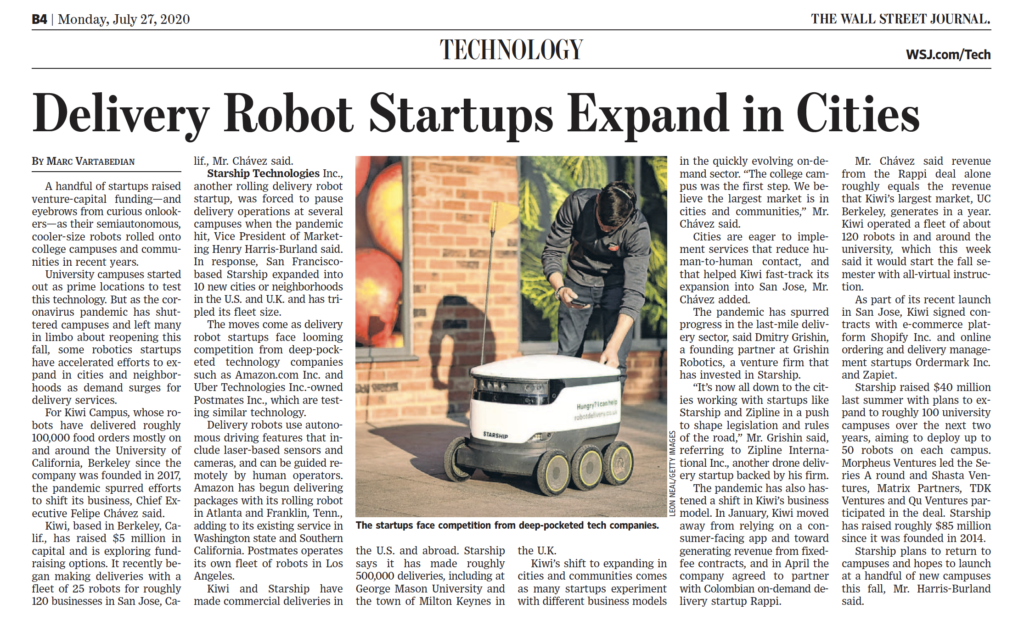BY MARC VARTABEDIAN – The Wall Street Journal
A handful of startups raised venture-capital funding and eyebrows from curious onlookers as their semiautonomous, cooler-size robots rolled onto college campuses and communities in recent years.
University campuses started out as prime locations to test this technology. But as the coronavirus pandemic has shuttered campuses and left many in limbo about reopening this fall, some robotics startups have accelerated efforts to expand in cities and neighborhoods as demand surges for delivery services.
For Kiwi Campus, whose robots have delivered roughly 100,000 food orders mostly on and around the University of California, Berkeley since the company was founded in 2017, the pandemic spurred efforts to shift its business, Chief Executive Felipe Chavez said.
Kiwi, based in Berkeley, Calif., has raised $5 million in capital and is exploring fundraising options. It recently began making deliveries with a fleet of 25 robots for roughly 120 businesses in San Jose, Calif., Mr. Chavez said.
Starship Technologies Inc., another rolling delivery robot startup, was forced to pause delivery operations at several campuses when the pandemic hit, Vice President of Marketing Henry Harris-Burland said. In response, San Francisco-based Starship expanded into 10 new cities or neighborhoods in the U.S. and U.K. and has tripled its fleet size.
The moves come as delivery robot startups face looming competition from deep-pocketed technology companies such as Amazon.com Inc. and Uber Technologies Inc. -owned Postmates Inc., which are testing similar technology.
Delivery robots use autonomous driving features that include laser-based sensors and cameras, and can be guided remotely by human operators. Amazon has begun delivering packages with its rolling robot in Atlanta and Franklin, Tenn., adding to its existing service in Washington state and Southern California. Postmates operates its own fleet of robots in Los Angeles.
Kiwi and Starship have made commercial deliveries in the U.S. and abroad. Starship says it has made roughly 500,000 deliveries, including at George Mason University and the town of Milton Keynes in the U.K.
Kiwi’s shift to expanding in cities and communities comes as many startups experiment with different business models in the quickly evolving on-demand sector. “The college campus was the first step. We believe the largest market is in cities and communities,” Mr. Chavez said.
Cities are eager to implement services that reduce human-to-human contact, and that helped Kiwi fast-track its expansion into San Jose, Mr. Chavez added.
The pandemic has spurred progress in the last-mile delivery sector, said Dmitry Grishin, a founding partner at Grishin Robotics, a venture firm that has invested in Starship.
“It’s now all down to the cities working with startups like Starship and Zipline in a push to shape legislation and rules of the road,” Mr. Grishin said, referring to Zipline International Inc., another drone delivery startup backed by his firm.
The pandemic has also hastened a shift in Kiwi’s business model. In January, Kiwi moved away from relying on a consumer-facing app and toward generating revenue from fixedfee contracts, and in April the company agreed to partner with Colombian on-demand delivery startup Rappi.
Mr. Chavez said revenue from the Rappi deal alone roughly equals the revenue that Kiwi’s largest market, UC BerkeleY, generates in a year. Kiwi operated a fleet of about 120 robots in and around the universitY, which this week said it would start the fall semester with all-virtual instruction.
As part of its recent launch in San Jose, Kiwi signed contracts with e-commerce platform Shopify Inc. and online ordering and delivery management startups Ordermark Inc. and Zapiet.
Starship raised $40 million last summer with plans to expand to roughly 100 university campuses over the next two years, aiming to deploy up to 50 robots on each campus. Morpheus Ventures led the Series A round and Shasta Ventures, Matrix Partners, TDK Ventures and Qu Ventures participated in the deal. Starship has raised roughly $85 million since it was founded in 2014.
Starship plans to return to campuses and hopes to launch at a handful of new campuses this fall, Mr. Harris-Burland said.
